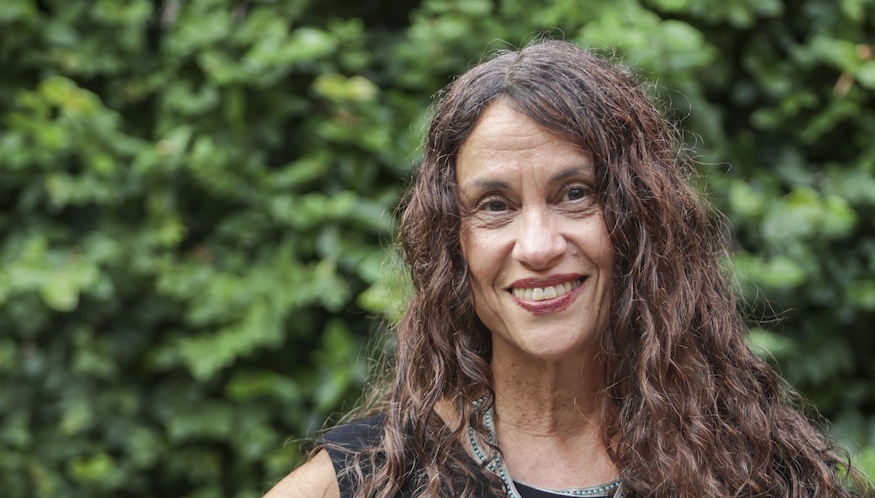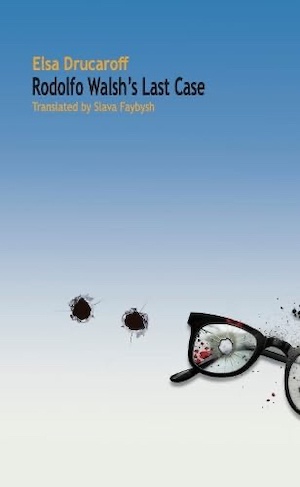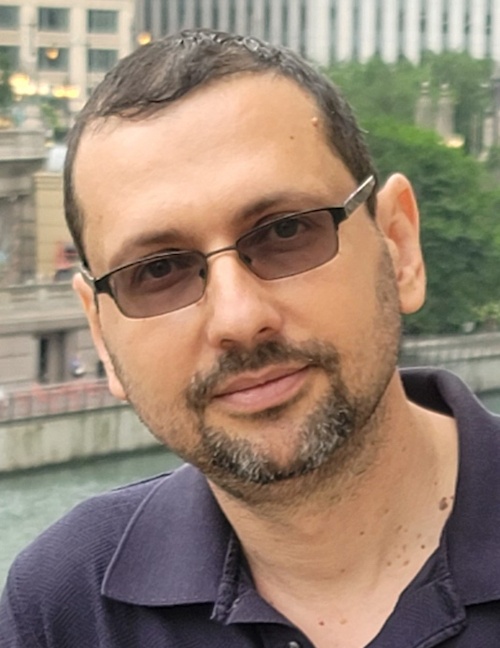
There isn’t much Argentinian crime fiction that makes it into English translation, but when does arrive it’s usually very interesting. Recently, the indie publisher Corylus Books introduced us to a new author – Elsa Drucaroff – with her novel Rodolfo Walsh’s Last Case.
Its title is unusual. Rodolfo Walsh? Sounds like he might be a private detective. However, in Argentina this is a name that resonates through the last 50 years of the country’s political history. Rodolfo Walsh was a left-wing journalist and author who worked against the Military Junta that ruled the country following the fall of Juan Perón and his allies, in the 1970s and 80s. And he paid the ultimate price. First his daughter and then he himself were killed by the regime.
Elsa Drucaroff is an Argentinian academic and writer who has studied the country’s history and literature. In 2009, her book Rodolfo Walsh’s Last Case was published in Argentina and made waves. Now, working with translator Slava Faybysh, who also helped with this interview, she’s brought the book to the English-speaking world. We invited her to join us for an interview to talk about creating a historical crime novel based on a real character and real events, but with a very personal fictional case for Walsh to investigate…
What made you decide to write a crime novel based on Rodolfo Walsh and his work?
I’ve read a lot of Walsh’s work, and the letter where he narrates his daughter’s death made me think that all the elements were there for a thriller in which he investigates that death. But also I needed a way to process my own thoughts and questions on the armed struggle in Argentina, outside of what is politically correct.
How did you research your novel?
I lived through that time period. I was a leftist teenager who admired Montoneros, even if I wasn’t involved in it directly. My own memory was one source. Other sources were Rodolfo Walsh’s work, my literary and historical research about his work, and his biography. Finally, I also interviewed some people who knew him or who were close to him.

Tell me more about the balance between his history and his character and personality, and how you portrayed that in the story?
The fate of María Victoria Walsh and Rodolfo Walsh is public knowledge. So is Walsh’s involvement as a militant in the guerrilla struggles of the 70s, as well as his literary and journalistic work. In contrast, I dreamed up the details of Walsh’s personal situation, along with the characters that surround him and the plot of the thriller. That part is completely imaginary.
I didn’t want to create a perfect, epic hero. I wanted to question the concept of hero, which seems patriarchal to me. ‘My’ Walsh is a father who suffers. He’s an honorable man, but also machista, like most men are. He’s intelligent, not very forthcoming when it comes to showing his emotions, and hardened by the demands of political militancy. I think that’s what the real Walsh was like.
Who are the other important characters, real or fictional, that readers will get to meet?
His first wife, a very intelligent woman who doesn’t agree with the political decisions that her ex-husband made or the life that he and her daughter have chosen. There’s Lila, Walsh’s partner in the present time of the novel, a committed and effective militant. There are various young people who choose a life of risk and militancy, with different political positions and different contradictions. A leader of the regime, General Oddone, who admires and is fascinated by a young soldier full of secrets, and establishes a fatherly relationship with him. These characters are completely fictional.
There’s also an English journalist, and while he doesn’t support the guerrilla movement, he’s deeply committed to the cause of human rights. This character is an homage to the British journalist Andrew Graham-Yooll, the director of the Buenos Aires Herald during the dictatorship years, although I conceive of him in my own way – he’s not an exact historical reconstruction. I tried to create multi-faceted characters with depth, who had doubts, flaws and feelings, even the nefarious leaders of the regime.
Colonel König is not based on the real Colonel Moori Koenig, a shady man who was one of the people responsible for the abduction of Eva Perón’s dead body. My character is based on the literary character crafted by Walsh in his story That Woman. This character is, in turn, based on Moori Koenig and was inspired by a real interview Walsh had with him. But as is usually the case with great literature, the literary character is nuanced in an incredibly interesting way, and it transcends Walsh’s negative ideological judgement of the man.
The ‘what if’ aspect of this story is very interesting. What key elements in the book come out of fact, and what parts of the story have you imagined?
In Letter to My Friends, Walsh recounts the death of his daughter in a confrontation with the army. He writes about a young conscript that was there, and this conscript told him that his daughter laughed as she fired off her machine gun, at the moment of her death. From this poignant description, I deduced that Rodolfo Walsh secretly tried to find someone who had participated in the military operation where his daughter died. This was key to imagining the plot of my thriller. This was how the character of Ariel was born.
In Rodolfo’s story That Woman there are these tiny, tiny details that helped me flesh out the character of König as well as elements of the plot. For example, in the story there’s a precious porcelain shepherdess, and its arm was broken by a bomb set by Peronist militants. This object becomes a plot point in my novel. The story itself also makes an appearance, along with Walsh’s detective stories. There’s one scene in which Walsh decodes an encrypted radio message from the military. This is an allusion to a historical fact: in 1961 Walsh, in Cuba, decoded a message and alerted Fidel Castro to the US plan to invade in the Bay of Pigs.

How difficult was it to create a continuity between real events and your story, and how well do you feel you met the challenge?
Up to now I’ve had this same challenge with all of my novels. On the one hand, I’m working with a historical-political context that I research, and on the other hand I’m working with action genres (detective novels, adventure novels, thrillers, melodramas). I build fictional plots and characters and insert my story into History, with a capital H. It’s a belated but utopian way of bringing justice after the fact. Which doesn’t mean sugarcoating the past or idealizing the characters as simply “good” or “bad”. It’s about raising questions and tensions, although it’s clear from my end what side I’m on as I tell the story.
How much of an impact did the novel have in your country when it came out in 2009?
There was a lot of impact. It was a moment in which the history of the guerrilla movement of the 70s was being reappraised. The book entered into that debate, and it was read as an homage to Walsh. It had good reviews in the press and generated some discourse among ex-militants, some of whom were offended by the liberties I took when I created this “hero,” who they wanted me to place on a pedestal.
And how has it been received now that it is reaching the English speaking world? What are some of the interesting comments you’ve received?
It moves me to see that in the UK reviews I read, there is a lot of awareness that, while I was going for action and tension, I also wanted to build complex characters, not one-dimensional ones. When the book came out in my country, this aspect was not perceived as much, maybe because it was an important moment in Argentina for memory, truth and justice around the crimes against humanity that the dictatorship had committed (and for which they had gone unpunished for many years). As a result, there was more discussion of the fact that the novel talked about these crimes. But now that the perpetrators of the genocide are in prison, it’s a good time to open up the discussion and our critical eye towards the nuances and contradictions of history, and to do that from the left, not to let the right be the ones to do that.
Its timing is interesting because democracy in various parts of the world seems under threat. Perhaps your novel is a useful warning about giving power to dictators?
The forces of the left, the more sensible forces when faced with social injustice and the horrors of capitalism, were nevertheless unable to muster up a concrete and effective political response. Their powerlessness and general political failure allow for the advance of the far right and movements based on brutality, ignorance, cruelty, and I would also say stupidity. Argentina lived through a horrendous dictatorship and now there’s a demented far-right government. I profoundly hope that this novel serves as a warning against dictatorships. These are very dark times.
Have you written any other crime novels and what’s next for you?
I’ve written historical novels that use elements of the thriller genre, such as El infierno prometido or The Promised Hell, which is set in Buenos Aires in 1927 and is about a mafia that traffics women. The second half of this novel is very much a thriller. I also used elements of noir and spy novels in a historical novel set during the anti-colonial wars that took place in South America during the 19th century. I’m about to publish a new book of short stories and an autobiographical book, but I’m not against returning to the thriller genre in the future. I’d like to combine it with horror and write something like a ghost thriller.









